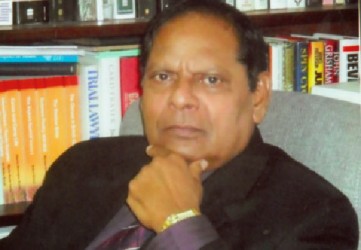The AFC yesterday warned that government could move to run the country as “an extra-parliamentary dictatorship,” by proroguing parliament and delaying the run off of early general elections
AFC Vice Chairman Moses Nagamootoo told a news conference yesterday at the Georgetown Club that he believed that government will not debate his party’s no-confidence motion against it—which is almost sure to pass in light of the main opposition APNU’s pledged support—and would choose instead to prorogue parliament.
“I can anticipate that this frightened government, this cowardly government, would perhaps already have a supplementary or an extraordinary issue of the Official Gazette waiting there to announce a prorogation in order to disrupt the sitting and to prevent the motion from proceeding. I can see that as a possibility,” Nagamootoo said.
He explained that should this be done, the government has up to 10 months to do “what they want,” without parliamentary objection or input, before an election is run off. “By proroguing parliament, President [Donald] Ramotar would be securing 10 months for his government without any parliamentary sitting and without any scrutiny,” Nagamootoo stated.
In his address to the nation on Tuesday, the President referred to either the prorogation or dissolution of Parliament to stave off a debate and vote on the AFC no-confidence motion, which is expected to be dealt with when the National Assembly reconvenes next Monday.

Article 69 (1) of the constitution says, “Each session of Parliament shall be held at such place within Guyana and shall begin at such time (not being later than six months from the end of the preceding session if Parliament has been prorogued or four months from the end of that session if Parliament has been dissolved) as the President shall appoint by proclamation.”
Cabinet Secretary Dr. Roger Luncheon yesterday remained tight-lipped on possible moves that government is mulling, saying that any decision would be suited to the specific situation. “I would want to believe, like in the court of law, intentions sometimes matter but the act is more important,” he told Stabroek News.
Nagamootoo explained that a prorogation of the National Assembly would suspend a session but would not bring the life of the Assembly to an end. “The president can prorogue parliament for as long as six months, during which time the PPP Government would not be responsible to the National Assembly and they could continue to dip their fingers in the treasury,” he said.
“Following the six months, the President would be free to reconvene the Assembly and, if still faced with the no-confidence motion, he may then dissolve parliament.
That would give him four months within which to hold an election,” he further noted, before adding that the country would then enter into “an extra-parliamentary dictatorship.”
Nagamootoo said that if he were a sitting president faced with a no-confidence motion, he would confront it head on. “I would expect a president to deal with it in a way that is open [and] transparent within the confines within the rule of law and not through the use of these underhand methods to meander, to duck, to hide and to avoid the motion…,” he stated.
“If the motion comes, you don’t, like a lil boy, say, ‘I ain’t playing… If you bring your motion I will bring cannons. I am going to occupy parliament. I will bring out meh big guns. Nandlall and them….’ You don’t use political blackmail. Presidents don’t behave that way,” he added.
He said that on Monday his party will be going into parliament with the hope that the motion will be tabled and debated despite the government’s “preemptive strikes.”
Ramotar’s announcement was an about-face for the administration, which had earlier said that government would not call snap elections to pre-empt the debate of the no-confidence motion.
This had been announced by Luncheon in September. Yesterday, Luncheon said the situation had changed.
“One would have to assume that prior to November 4th… engagements were taking place. In essence, one could look, one could anticipate, that there was a comprehensive review of developments and there were bilateral engagements and on November 4th a decision was made that ‘This is the assessment of where we are and what possibilities exist and this is the government’s response,’” he said.
“There may be visible, patent, what you might say, inconsistencies, with a position held earlier, with a position held today. But is this not the hallmark of reasonable people who are engaged in the political process? But at some point and time, and November the 4th was that day, the president clarified, for all and sundry, this is my final position.
Let’s not worry about what went before. What happened before influenced but at the end of the day November the 4th is where we draw the line,” he added.




